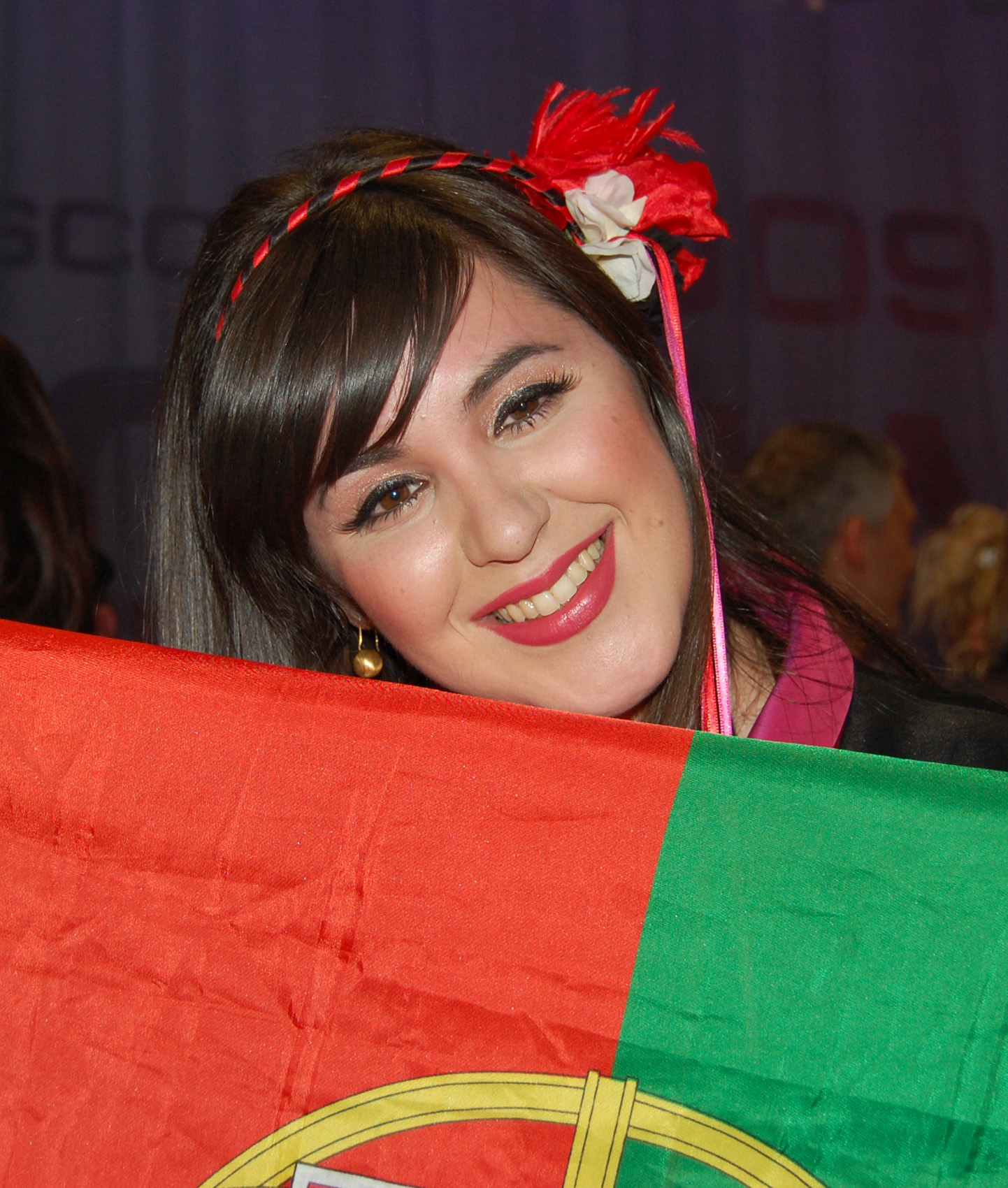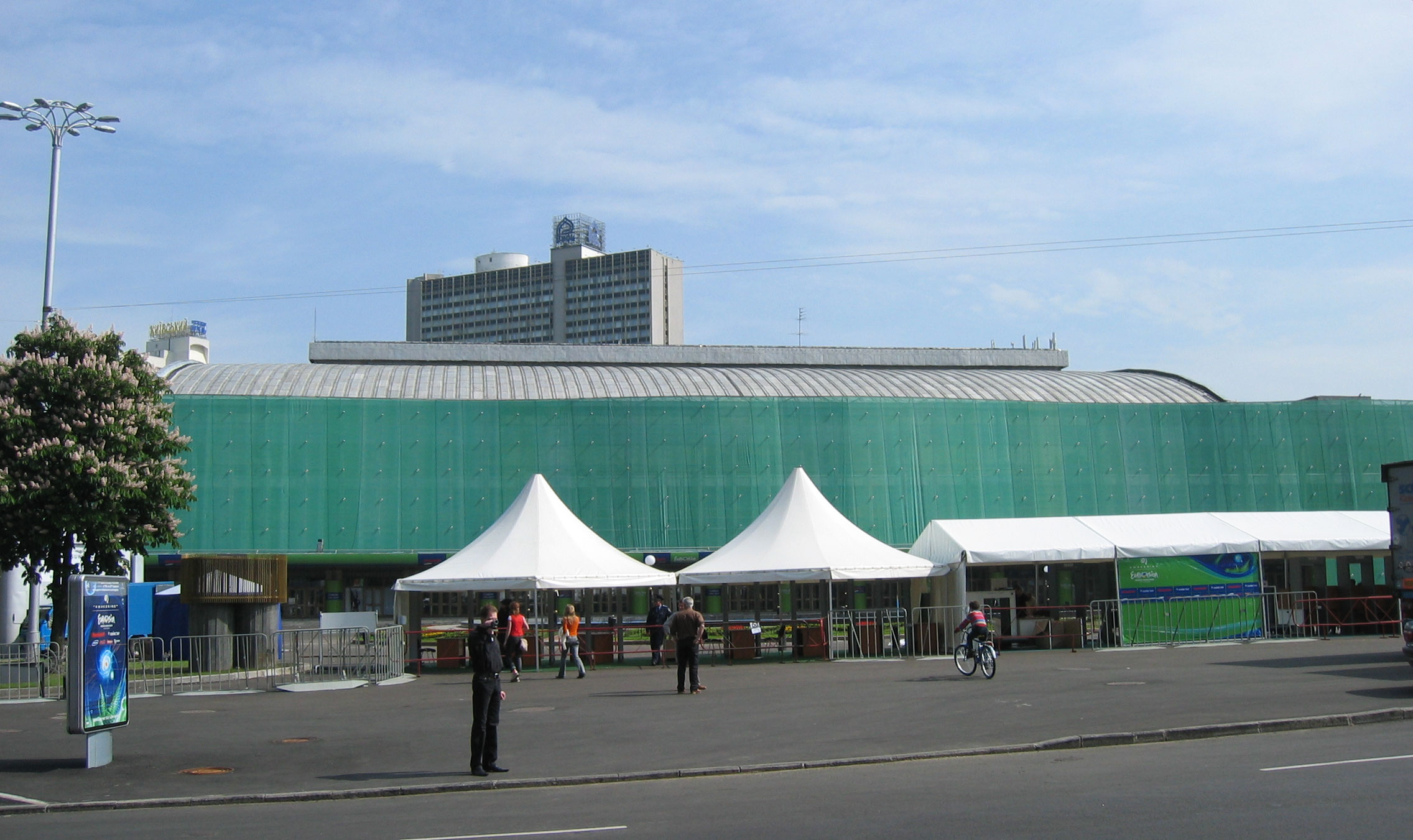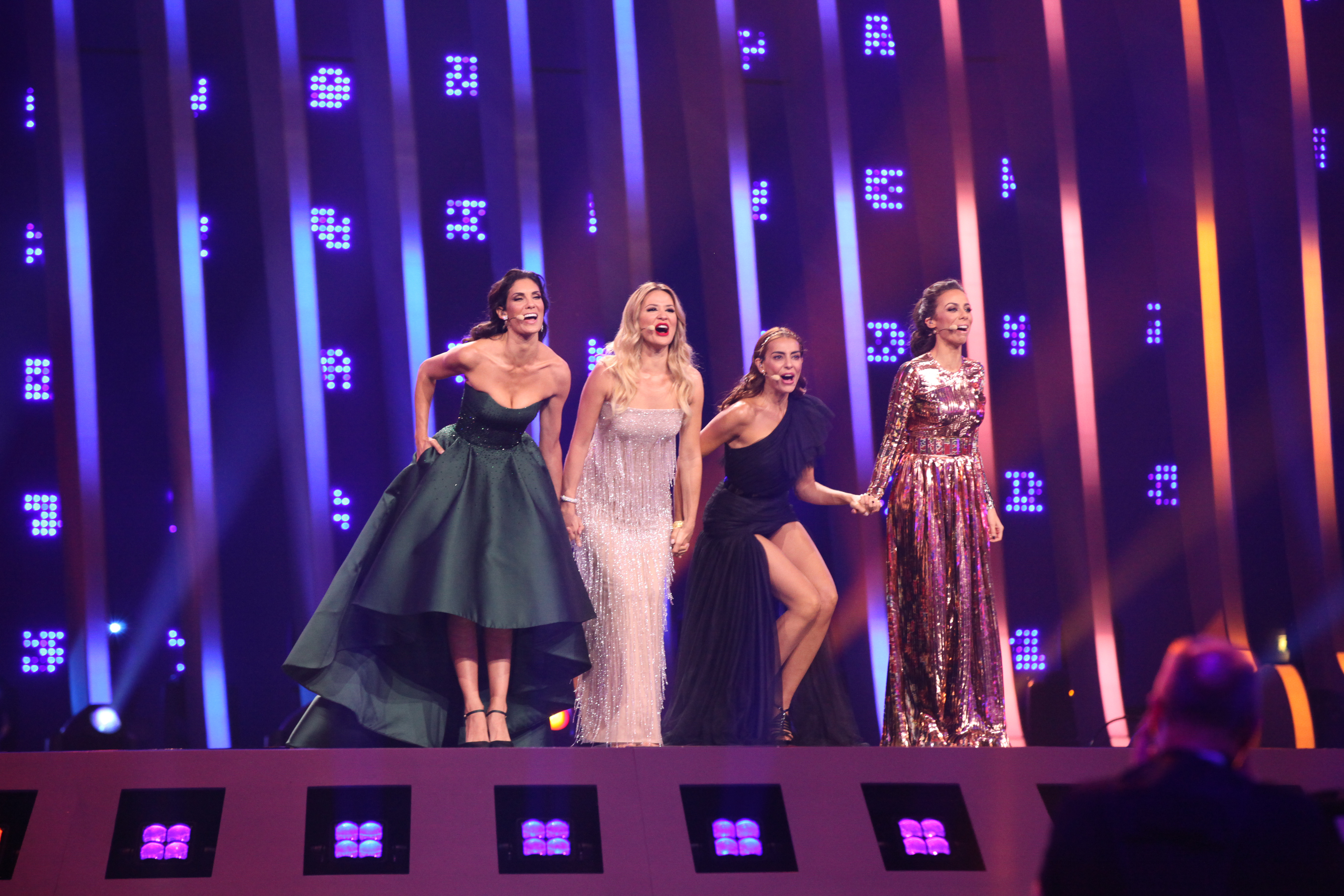|
Portugal In The Eurovision Song Contest 2009
Portugal participated in the Eurovision Song Contest 2009 with the song "Todas as ruas do amor" written by Pedro Marques and Paulo Pereira. The song was performed by the group Flor-de-Lis. The Portuguese broadcaster Rádio e Televisão de Portugal (RTP) organised the national final ''Festival da Canção 2009'' in order to select the Portuguese entry for the 2009 contest in Moscow, Russia. The competition took place on 28 February 2009 where "Todas as ruas do amor" performed by Flor-de-Lis emerged as the winner after achieving the highest score following the combination of votes from twenty regional juries and a public televote. Portugal was drawn to compete in the first semi-final of the Eurovision Song Contest which took place on 12 May 2009. Performing during the show in position 16, "Todas as ruas do amor" was announced among the 10 qualifying entries of the first semi-final and therefore qualified to compete in the final on 16 May. It was later revealed that Portugal placed ... [...More Info...] [...Related Items...] OR: [Wikipedia] [Google] [Baidu] |
Flor-de-Lis
Flor de Lis is a Portuguese folk music group which represented Portugal at the Eurovision Song Contest 2009 in Moscow, Russia, following their victory in the 45th edition of Festival da Canção, with the song "Todas as ruas do amor" ( en, All the streets of love). It qualified for the final from the first semi final where it finished 15th. Biography The beginnings The beginnings of Flor de Lis are closely linked to Pedro Marques' participation as a percussionist in the "Adufe" project, first conceived by José Salgueiro as an attraction for Expo-98, and which focussed on traditional Portuguese instruments. The resulting success led to several national and international events being held between 1999 and 2000, unearthing musician Pedro Marques' desire to explore the vast wealth of Portuguese music in conjunction with musical elements from other parts of the world. The project began to take shape in 2001, with the participation of several musicians in recording sessions ... [...More Info...] [...Related Items...] OR: [Wikipedia] [Google] [Baidu] |
Eurovision Song Contest 2005
The Eurovision Song Contest 2005 was the 50th edition of the Eurovision Song Contest. It took place in Kyiv, Ukraine, following the country's victory at the with the song "Wild Dances" by Ruslana. Organised by the European Broadcasting Union (EBU) and host broadcaster National Television Company of Ukraine (NTU), the contest was held at the Palace of Sports, and consisted of a semi-final on 19 May, and a final on 21 May 2005. The two live shows were presented by Ukrainian television presenters Maria Efrosinina and Pavlo Shylko. Thirty-nine countries participated in the contest, three more than the previous record of thirty-six, that took part the year before. Bulgaria and Moldova made their first participation this year, while Hungary returned to the contest after a six-year absence, having last taken part in . The winner was with the song "My Number One", performed by Helena Paparizou and written by Manos Psaltakis, Christos Dantis and Natalia Germanou. This was Greece's firs ... [...More Info...] [...Related Items...] OR: [Wikipedia] [Google] [Baidu] |
Luciana Abreu
Luciana Abreu Sodré Costa Real (born 25 May 1985) is a Portuguese singer, actress and television host. Luciana Abreu is known for her participation in ''Idolos'', for representing Portugal in the Eurovision Song Contest 2005 as part of the pop-duo 2B, for her character in 2006 for Floribella as Flor Valente. Biography Early years She was first noticed at the age of 14, for her participation in the show "Cantigas da Rua", which she won. During 2002 she took part in the play ''O Casamento'', by the ''Seiva Trupe'' theatre company, as both actress and singer. Later, in 2003, she starred in the musical play ''Cabaret Carioca'' by Carlos Leça, inspired by Chico Buarque's music, in which she took the role of ''Beatriz''. ''Idolos'' (Idols) In 2004, Luciana auditioned for the second season of ''Idolos'' (the Portuguese version of ''Pop Idol'' (British original version)). She was a member of the first group of semi-finalists. She sang a rendition of Christina Aguilera's "The Voi ... [...More Info...] [...Related Items...] OR: [Wikipedia] [Google] [Baidu] |
Portugal In The Eurovision Song Contest 1990
Portugal has participated in the Eurovision Song Contest 53 times since its debut at the 1964 contest. Since then it has missed five contests (, , , and ). The contest is broadcast in Portugal by Rádio e Televisão de Portugal (RTP). Portugal won the contest for the first time in and hosted the contest in Lisbon. Portugal finished last on its debut in 1964 and again in , before achieving its best result of the 20th century in , with Lúcia Moniz finishing sixth. The country then finished last for the third time in . Having not appeared in the final since and as holders of the record for most appearances in the contest without a win, Portugal won at the 49th attempt, when Salvador Sobral won the 2017 contest with the song "", Portugal's first top-five result in the contest. As hosts in 2018, the country finished last in the contest for a fourth time. History Portugal's debut entry was António Calvário with "". It was not a successful debut for the country, with Calvário ... [...More Info...] [...Related Items...] OR: [Wikipedia] [Google] [Baidu] |
Nucha (singer)
Nucha (born Cristina Isabel dos Santos Baldaia Trindade on 21 June 1966) is a Portuguese singer, best known for her participation in the 1990 Eurovision Song Contest. Biography Nucha's first participation in Portugal's Eurovision selection, ''Festival da Canção'', was in 1988 with the song "Se calhar", but this failed to pass the semi-final stage. She entered ''Festival da Canção'' a second time in 1990, and this time was successful with the song " Há sempre alguém" ("There's Always Someone") winning the juries' vote. "Há sempre alguém" went forward to the 35th Eurovision Song Contest, held on 5 May in Zagreb, where it did not prove popular, finishing in 20th place of the 22 entries, having received points only from the Luxembourg and United Kingdom juries. However, the song did prove to be popular in Portugal. Nucha's first album, ''Tu vais ver'', was released in 1992, followed two years later by the more successful ''Todos me querem''. Four further albums followed ... [...More Info...] [...Related Items...] OR: [Wikipedia] [Google] [Baidu] |
Portugal In The Eurovision Song Contest 1983
Portugal was represented by Armando Gama, with the song "Esta balada que te dou", at the 1983 Eurovision Song Contest, which took place in Munich on 23 April. Gama was the winner of the Portuguese national final for the contest, held on 5 March. The song was chosen through a national final organised by broadcaster RTP. Before Eurovision Festival da Canção 1983 The national final was held at the Coliseu in Porto in Porto, hosted by Valentina Torres and Eládio Clímaco. The winning song was chosen by the votes of 22 regional juries. Armando Gama previously took part in the 1980 Portuguese semi-finals with the group Sarabanda. Carlos Paião represented Portugal in ESC 1981. At Eurovision On the night of the final Gama performed 17th in the running order, following Israel and preceding Austria. At the close of voting "Esta balada que te dou" placing Portugal 13th of the 20 entries. The Portuguese jury awarded its 12 points to the winner song from Luxembourg. Voting ... [...More Info...] [...Related Items...] OR: [Wikipedia] [Google] [Baidu] |
Armando Gama
Armando António Capelo Diniz da Gama (1 April 1954 – 17 January 2022) was a Portuguese singer-songwriter and baritone opera singer, whose physical trademark for decades was his shoulder-length jet black hair. Life and career Gama grew up in Portuguese Angola, an overseas territory of Portugal by then, and lived there until the age of 17. Upon moving to mainland Portugal in 1971, he scored the first of many No. 1 hits on the Portuguese music charts. He was well-versed in performing piano and solfège, having studied them at the music conservatory in Luanda until he was a teenager. In his decades-long music career, he sold over five million records in Portugal alone. He became well-known internationally performing at the Eurovision Song Contest 1983, singing the song " Esta balada que te dou," ranking 13th out of 20 countries. Gama still performed in his later years, and presented a live show called "Armando Gama: The Fifth Beatle," in which he performed cover versions of wel ... [...More Info...] [...Related Items...] OR: [Wikipedia] [Google] [Baidu] |
Portuguese Language
Portuguese ( or, in full, ) is a western Romance language of the Indo-European language family, originating in the Iberian Peninsula of Europe. It is an official language of Portugal, Brazil, Cape Verde, Angola, Mozambique, Guinea-Bissau and São Tomé and Príncipe, while having co-official language status in East Timor, Equatorial Guinea, and Macau. A Portuguese-speaking person or nation is referred to as " Lusophone" (). As the result of expansion during colonial times, a cultural presence of Portuguese speakers is also found around the world. Portuguese is part of the Ibero-Romance group that evolved from several dialects of Vulgar Latin in the medieval Kingdom of Galicia and the County of Portugal, and has kept some Celtic phonology in its lexicon. With approximately 250 million native speakers and 24 million L2 (second language) speakers, Portuguese has approximately 274 million total speakers. It is usually listed as the sixth-most spoken language, the third-most sp ... [...More Info...] [...Related Items...] OR: [Wikipedia] [Google] [Baidu] |
RTP Internacional
RTP Internacional (RTPi) is a Portuguese free-to-air television channel owned and operated by state-owned public broadcaster Rádio e Televisão de Portugal (RTP). It is the company's international television service, and is known for broadcasting a mix of programming from other RTP's channels, together with special ''Contacto'' programmes aimed at Portuguese communities in Europe, Africa, the Americas, as well as Macao and East Timor. History It first started broadcasting via satellite in Europe on 10 June 1992 (Portugal Day). It soon expanded into Africa, where it reached audiences in Portuguese-speaking countries, as well as Canada, United States, Brazil and into Asia. It is also available on the Internet, via a subscription to the service JumpTV or with Octoshape. On 7 January 1998, RTPi ceased terrestrial broadcasting to Portuguese-speaking countries in Africa, and was replaced by a new separate service, called RTP África, which was available as a terrestrial TV service i ... [...More Info...] [...Related Items...] OR: [Wikipedia] [Google] [Baidu] |
RTP África
RTP África is a Portuguese television channel owned and operated by state-owned public broadcaster Rádio e Televisão de Portugal (RTP). It is available in the Portuguese-speaking African countries, where it is available as a basic cable and satellite channel, with the exception of Cabo Verde, where it is available as a free-to-air channel, distributed by the country's digital terrestrial television network. RTP África is also available for free on RTP's platform RTP Play. Its programming comes from the Portuguese public and private television channels and African public networks, RTP África also airs its own news, food and music TV shows. The channel is especially developed for the African communities and the cultural interchange between them and Portugal and for the Portuguese populations of Lusophone Africa. Due to a protocol, the channel also transmits programs from the United Nations dubbed in Portuguese. The channels' primetime news program, ''Repórter África'', focus ... [...More Info...] [...Related Items...] OR: [Wikipedia] [Google] [Baidu] |
RTP1
RTP1 (''RTP um'') is a Portuguese free-to-air television channel owned and operated by state-owned public broadcaster Rádio e Televisão de Portugal (RTP). It is the company's flagship television channel, and is known for broadcasting mainstream and generalist programming, including '' Telejornal'' news bulletins, prime time drama, cinema and entertainment, and major breaking news, sports and special events. It was launched on 7 March 1957 as the first regular television service in Portugal. It was the only one until 25 December 1968, when RTP launched a second channel. Two regional channels followed, RTP Madeira on 6 August 1972 and RTP Açores on 10 August 1975. As RTP held a monopoly on television broadcasting in the country, they were the only television channels until the first commercial television was launched on 6 October 1992, when SIC started broadcasting nationwide. The channel was initially simply referred to as "RTP". It received other names, such as "I Program ... [...More Info...] [...Related Items...] OR: [Wikipedia] [Google] [Baidu] |
Sílvia Alberto
Sílvia Alberto (born 18 May 1981) is a Portuguese television presenter and actress, currently employed by Rádio e Televisão de Portugal. She began her career in 2000, presenting ''Clube Disney'' on RTP1. She was one of the hosts of the 2018 Eurovision Song Contest in Lisbon, Portugal. Early life She studied Theatre at the Lisbon Theatre and Film School. Career Alberto is best known for hosting seven editions of ''Festival da Canção'' (Portuguese heats for the Eurovision Song Contest), ''Dança Comigo'' (Portuguese version of ''Strictly Come Dancing''), ''Operação Triunfo'', ''MasterChef'', ''Top Chef'' and presenting the RTP talent programme ''Aqui há talento''. She also had a three year stint with the broadcaster SIC, where she co-hosted the first two series of '' Ídolos'' and the 2004 Portuguese Golden Globes. On 8 January 2018, she was announced as one of the four hosts of the 2018 Eurovision Song Contest alongside Filomena Cautela, Daniela Ruah, and Catarina Fu ... [...More Info...] [...Related Items...] OR: [Wikipedia] [Google] [Baidu] |




